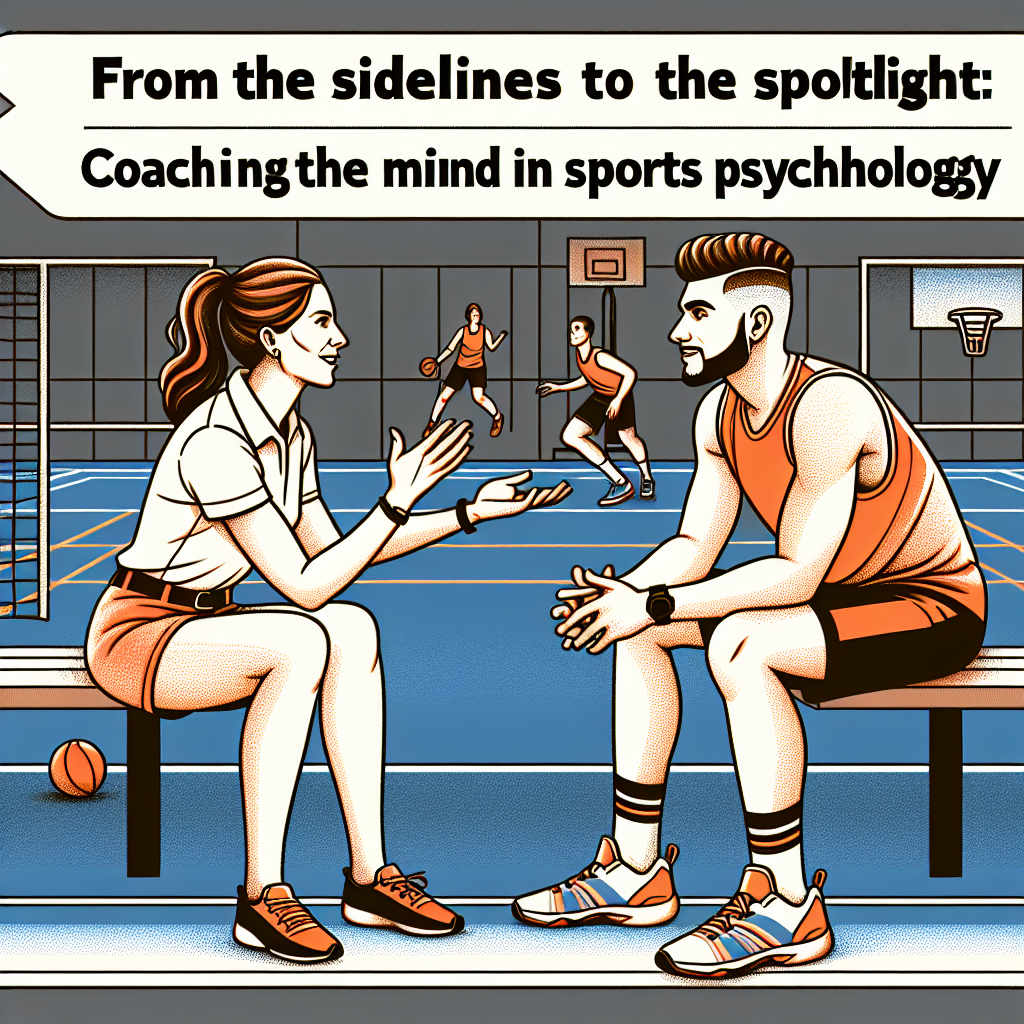
Introduction
In the world of sports, the physical prowess of athletes often takes center stage. But behind every show-stopping performance lies an equally crucial component—the athlete’s mindset. The concept of "From the Sidelines to the Spotlight: Coaching the Mind in Sports Psychology" emphasizes the transformative power of mental training in sports performance. As spectators, we admire the athletic feats on display, often overlooking the intricate mental strategies that propel athletes to greatness. In a competitive landscape, mental resilience can be the defining factor that distinguishes the winner from the runner-up. This article delves deep into how sports psychology can elevate athletes from the sidelines to the spotlight, offering unique insights, case studies, and actionable strategies.
The Importance of Mental Coaching in Sports
Understanding Sports Psychology
Sports psychology focuses on the mental and emotional factors that influence sports performance. It encompasses a range of topics, including motivation, focus, anxiety management, and self-confidence. By nurturing these aspects, athletes can perform at their peak.
| Key Areas of Focus in Sports Psychology |
|---|
| Motivation |
| Self-Confidence |
| Focus and Concentration |
| Anxiety Management |
| Visualization Techniques |
The Role of a Sports Psychologist
A sports psychologist acts as a coach for the mind, helping athletes recognize and harness their mental strengths. They employ techniques such as cognitive-behavioral therapy, mindfulness training, and goal-setting strategies. These practices allow athletes to manage stress, set achievable goals, and maintain a winning mindset.
Mindset Matters: From Sidelines to Spotlight
The Impact of Mental Resilience
Mental resilience refers to the ability to bounce back from challenges and setbacks. In sports, the top performers exhibit extraordinary mental resilience. This quality is not innate; it can be cultivated through targeted mental training.
Case Study: Michael Phelps
Michael Phelps, the most decorated Olympian of all time, serves as a prime example of mental resilience. Throughout his career, Phelps faced numerous challenges, including anxiety and depression. By working with sports psychologists, he developed coping strategies such as visualization and positive self-talk. This mental training enabled him to perform spectacularly under pressure, turning moments of doubt into triumphs.
Developing a Winning Mindset
A winning mindset is more than just positive thinking; it involves a coherent strategy to overcome mental barriers.
Goal-Setting: Clear, SMART (Specific, Measurable, Achievable, Relevant, Time-bound) goals help athletes focus their efforts.
Visualization: Athletes mentally visualize their performance to enhance confidence and prepare for competition.
- Positive Self-Talk: Encouraging inner dialogue can help athletes maintain motivation and combat self-doubt.
Techniques in Sports Psychology
Cognitive-Behavioral Strategies
Cognitive-behavioral strategies help athletes reshape negative thoughts. By identifying and challenging self-defeating beliefs, they can improve their self-image and performance.
Case Study: Serena Williams
Serena Williams is renowned for her incredible focus and determination. Throughout her career, she has utilized cognitive-behavioral techniques to manage high-stakes match pressure. When she faced adversity, she reframed her thoughts to focus on victory rather than fear of failure, propelling her to success.
Mindfulness and Stress Reduction
Mindfulness techniques, such as meditation and breathing exercises, can help athletes stay calm and focused. These practices allow athletes to be present, reducing anxiety and improving performance.
| Mindfulness Techniques for Athletes |
|---|
| Deep Breathing Exercises |
| Guided Meditation |
| Progressive Muscle Relaxation |
| Mindful Movement (Yoga, Tai Chi) |
Case Study: The Effect of Mindfulness on NFL Players
A recent study involving NFL players indicated that those who practiced mindfulness reported lower anxiety levels and better focus during games. By integrating mindfulness into their training regimens, these athletes experienced improved performance and reduced burnout.
The Future of Sports Psychology
Technology and Mental Training
Advancements in technology are revolutionizing how athletes approach mental training. Virtual reality (VR) platforms are emerging as a tool for improving focus and anxiety management.
Case Study: VR Training for Olympic Athletes
Olympic athletes are beginning to use VR technology for mental rehearsal. By simulating competitive environments, they can practice responses to high-pressure situations without physical limitations. This innovative approach is proving effective in building mental toughness.
Actionable Strategies for Coaches and Athletes
Building a Supportive Environment
Creating a culture that values mental wellness is vital. Coaches can foster an atmosphere where mental health is openly discussed, reducing stigma and encouraging athletes to seek help when needed.
Incorporating Mental Training into Practice
Coaches can integrate mental training into regular practice sessions, ensuring that athletes understand its importance just as much as their physical training.
Regular Mental Skills Workshops: Hosting workshops led by sports psychologists can facilitate open discussions about mental health.
- Incorporate Mental Drills: Utilize visualization exercises and mindfulness practices during training to reinforce mental resilience.
Conclusion
“From the Sidelines to the Spotlight: Coaching the Mind in Sports Psychology” encapsulates the essence of modern athletic performance. Athletes are not just physical beings; their minds play an equally essential role in achieving excellence. By integrating sports psychology principles into training regimens, embracing mental resilience, and fostering a supportive environment, athletes can unlock new levels of performance.
Athletes and coaches alike are encouraged to view mental training as crucial as physical conditioning. Remember, the spotlight shines brightly on those who master both their bodies and their minds.
FAQs
1. What is sports psychology?
Sports psychology is the study and application of psychological principles to support athletes in improving their performance and managing the mental challenges of sports.
2. How can athletes benefit from mental coaching?
Mental coaching helps athletes develop resilience, enhance focus, manage anxiety, and bolster confidence—critical components for peak performance.
3. Are there any specific techniques in sports psychology that I can practice?
Yes! Techniques such as visualization, positive self-talk, and mindfulness exercises are beneficial for athletes at all levels.
4. How can coaches support athletes’ mental health?
Coaches can create a supportive atmosphere, encourage open communication about mental health, and integrate mental training into regular practice.
5. Is mental training just for elite athletes?
No, mental training can benefit athletes of all levels. Anyone can use psychological principles to enhance their performance and well-being.
Incorporating sports psychology into training is not just about enhancing performance; it’s about fostering a holistic approach to athlete well-being. Embrace the journey "From the Sidelines to the Spotlight" and watch your performance soar.














